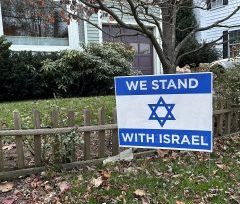
November continued to be a very challenging month. I’ve stayed in touch with the Israeli mother I mentioned in last month’s newsletter, who wasn’t able to come with her son to my grandson’s bar mitzvah as they had planned. I felt compelled to and was glad to participate in the November 14 rally for Israel in Washington DC; she told me afterwards that Israelis appreciated that so many Americans showed up. I think that was the most impactful aspect of the rally.
The next day my friend and her three children were volunteering around the hostage families’ march to Jerusalem. Most recently she expressed the way I feel – “relieved to see some hostages return, but terrified about the fate of hundreds more,” and worried about her husband, called up as an IDF reservist, who is still in Gaza. I can’t imagine how worrying that must be.
It doesn’t feel appropriate to say much at this time about interfaith family inclusion. As I indicated last month, I hope that what’s happening in Israel will result in more open and generous attitudes among traditional Jews towards interfaith families and their family members who have different faith backgrounds, because the Jewish people need as broad a tent as possible.
In that regard, there was news from Israel that bears mention: a young woman murdered on October 7, whose father was Jewish but whose mother was not, was refused burial inside a Jewish cemetery. Under Jewish law, only Jews can be buried in Jewish cemeteries. So instead, she was buried in an area “outside the fence” of the cemetery.
The Jerusalem Post, the Times of Israel, and Ha’aretz reported that quite an uproar resulted (I would say, very appropriately). As the woman’s mother said, her daughter “was murdered as a Jew.” Various politicians apologized for the insulting treatment that “bordered on criminal.” A solution was found, to lower the fence, and let it be covered eventually with shrubs, preserving the halachic separation, while not so obviously demeaning and ostracizing the non-halachic Jew.
As I’ve said many times, it behooves the traditional community to acknowledge that there is more than one way to be Jewish, and that it’s in the interest of the Jewish community as a whole to include those who want to be included but are not halachically Jewish, at least for all purposes where halachic status is not critical. They should want people who identify as Jews but are not halachically Jewish to stand in support of Israel. Relegating an October 7 victim to a clearly second-class area of a cemetery isn’t conducive to that.
Similarly, I had no issue with the fact that there was quite a heavy Orthodox presence at the Washington DC rally, but I was asked at least five times by earnest young men if I had put on tefillin yet that day. That question is very alienating to me; putting on tefillin is not part of my practice, and it’s not respectful of my choice to suggest that it should be. I wonder if the leaders of groups which encourage these young men ever consider the possible off-putting consequence, that it might distance people from Jewish engagement.
Finally, I can’t help but note that Hanukkah is rapidly approaching, and December of course is always the biggest month for interfaith family issues. I expect there will be less of that this year, with attention focused appropriately on what’s happening in Israel. It seems like a long time, but something I wrote that was published in the Forward five years ago still expresses my thoughts about the December holidays well: Stop Criticizing Interfaith Families Who Celebrate Christmas.

Leave a Reply